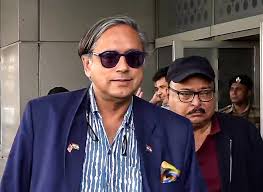After Shashi Tharoor’s ‘don’t ask permission to fly’ post, Congress MP warns of ‘predatory birds’ on the hunt

Congress MP Shashi Tharoor recently shared a poetic message on social media that stirred political chatter. His cryptic words prompted a sharp response from fellow MP Manickam Tagore. Their exchange, rich in metaphor, points to deeper rifts within the Congress party.
Tharoor’s Call for Freedom
On June 25, 2025, Tharoor posted a striking message on X:
“Don’t ask permission to fly. The wings are yours, and the sky belongs to no one.”
The post showed a bird in flight. Many viewed this as a symbolic challenge to party discipline. It came soon after Congress president Mallikarjun Kharge criticized unnamed members for putting “Modi first, country later.”
Tharoor had earlier praised Prime Minister Modi’s swift handling of Operation Sindoor. That praise drew concern within Congress, where leaders fear such remarks blur ideological lines.
Tagore’s Veiled Caution
A day later, Manickam Tagore responded with his own message:
“Even a free bird must watch the skies—hawks, vultures, and ‘eagles’ are always hunting…”
He warned that political freedom comes with risks. His imagery of “predatory birds” was seen as a jab at the BJP. Tagore’s post suggested that nationalist rhetoric may mask political danger.
Underlying Tensions
Tharoor often balances individual expression with party loyalty. His intellectual and diplomatic style appeals to urban voters. But it also invites criticism from Congress insiders who value unity over nuance.
Kharge’s speech, though indirect, seemed aimed at Tharoor. By warning against leaders who praise Modi, Kharge underscored growing divisions.
Tharoor’s absence from Congress campaigns in his home turf, Thiruvananthapuram, added to speculation. Some wonder if he was sidelined. Others believe he’s distancing himself from party disputes.
Symbolism and Strategy
The exchange between Tharoor and Tagore isn’t just poetic—it’s political. Their bird metaphors mask sharp commentary on internal discipline and external threats.
Tharoor’s message suggests a desire for personal and political freedom. Tagore’s reply stresses caution. It warns of betrayal dressed as nationalism.
This kind of tension isn’t new in the Congress. But it is becoming harder to manage as elections approach. The party must juggle ideological clarity, public messaging, and internal harmony.
Looking Ahead
Congress faces a choice. Should it embrace leaders like Tharoor who offer fresh voices? Or should it demand stricter loyalty in public statements?
For now, the leadership remains silent. But voters and rivals alike are watching. If these metaphoric battles continue, the party may need to act—to unify or to clarify.






